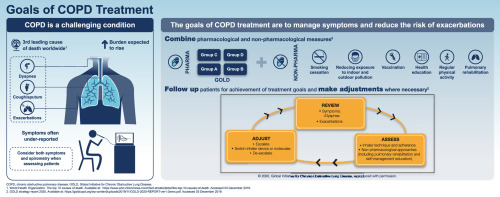Respiratory Medicine ( IF 3.5 ) Pub Date : 2020-03-21 , DOI: 10.1016/j.rmed.2020.105938 Claus F Vogelmeier 1 , Miguel Román-Rodríguez 2 , Dave Singh 3 , MeiLan K Han 4 , Roberto Rodríguez-Roisin 5 , Gary T Ferguson 6

|
Chronic obstructive pulmonary disease (COPD) is currently a leading cause of death worldwide, and its burden is expected to rise in the coming years. Common COPD symptoms include dyspnea, cough and/or sputum production. Some patients may experience acute worsening of symptoms (known as an exacerbation), and therefore require additional therapy. Exacerbations are mainly triggered by respiratory infections and environmental factors. Healthcare professionals face many challenges in COPD management, including the heterogeneity of the disease and under-reporting of symptoms. The authors review these challenges and provide recommendations for the best methods to assess COPD. The goals of COPD treatment include recognising the impact that both symptoms and exacerbations have on patients’ lives when considering optimal patient-focused management. The review discusses the need for COPD management strategies to include both pharmacologic and non-pharmacologic approaches and provides recommendations for monitoring treatment outcomes and adjusting management strategies accordingly. Novel treatment strategies including precision medicine and point-of-care testing are also discussed.
中文翻译:

COPD治疗的目标:关注症状和病情加重。
慢性阻塞性肺疾病(COPD)当前是全球范围内的主要死亡原因,并且预计其负担在未来几年会增加。常见的COPD症状包括呼吸困难,咳嗽和/或痰液产生。一些患者可能会经历症状的急性恶化(称为恶化),因此需要额外的治疗。病情加重主要是由呼吸道感染和环境因素引起的。医疗保健专业人员在COPD管理中面临许多挑战,包括疾病的异质性和症状报告不足。作者回顾了这些挑战,并为评估COPD的最佳方法提供了建议。COPD治疗的目标包括:在考虑以患者为中心的最佳治疗方法时,应认识到症状和病情加重对患者生活的影响。该评论讨论了COPD管理策略包括药理方法和非药理方法的必要性,并提供了监测治疗结果并相应调整管理策略的建议。还讨论了包括精确医学和即时检验在内的新型治疗策略。





















































 京公网安备 11010802027423号
京公网安备 11010802027423号